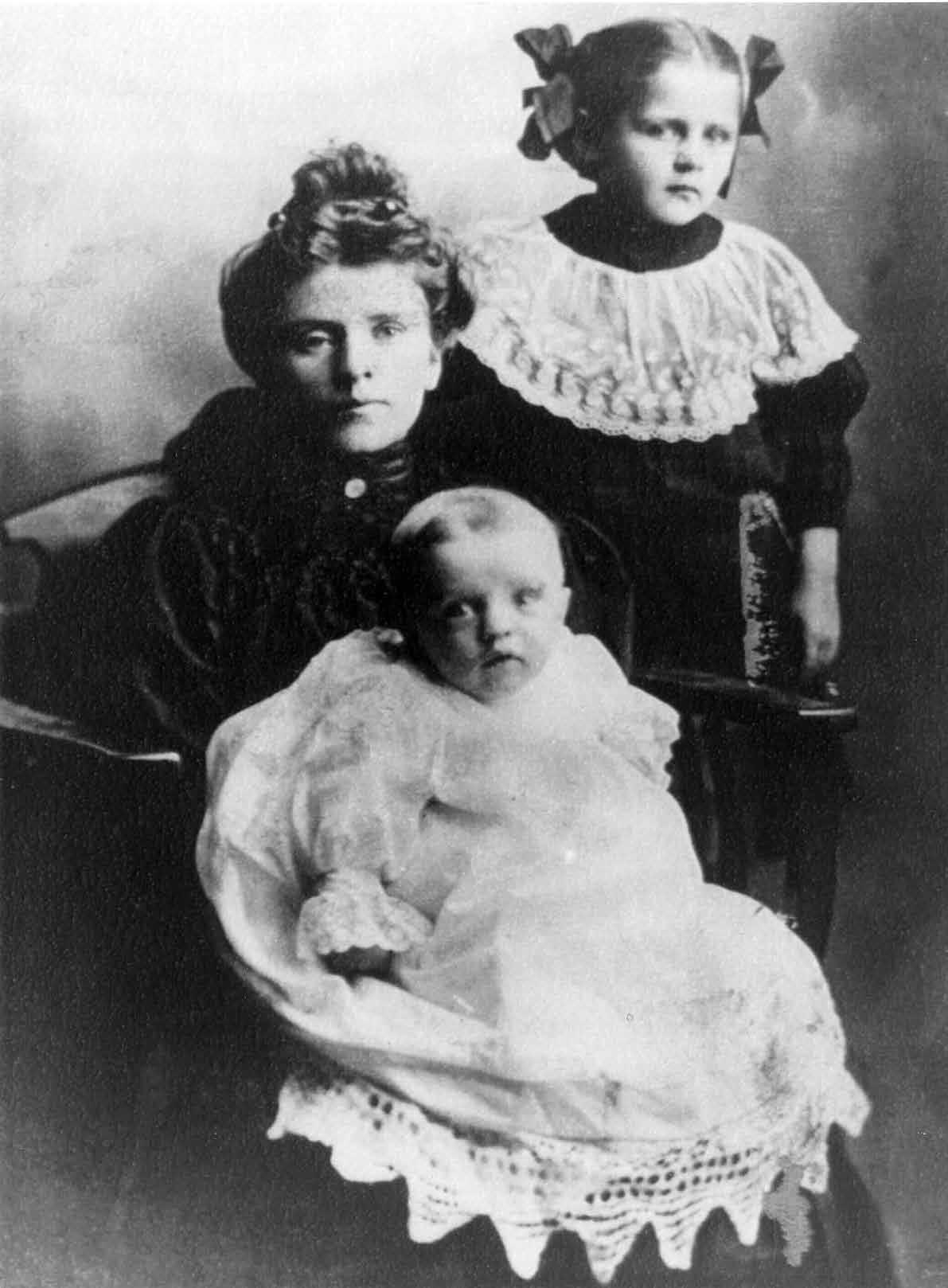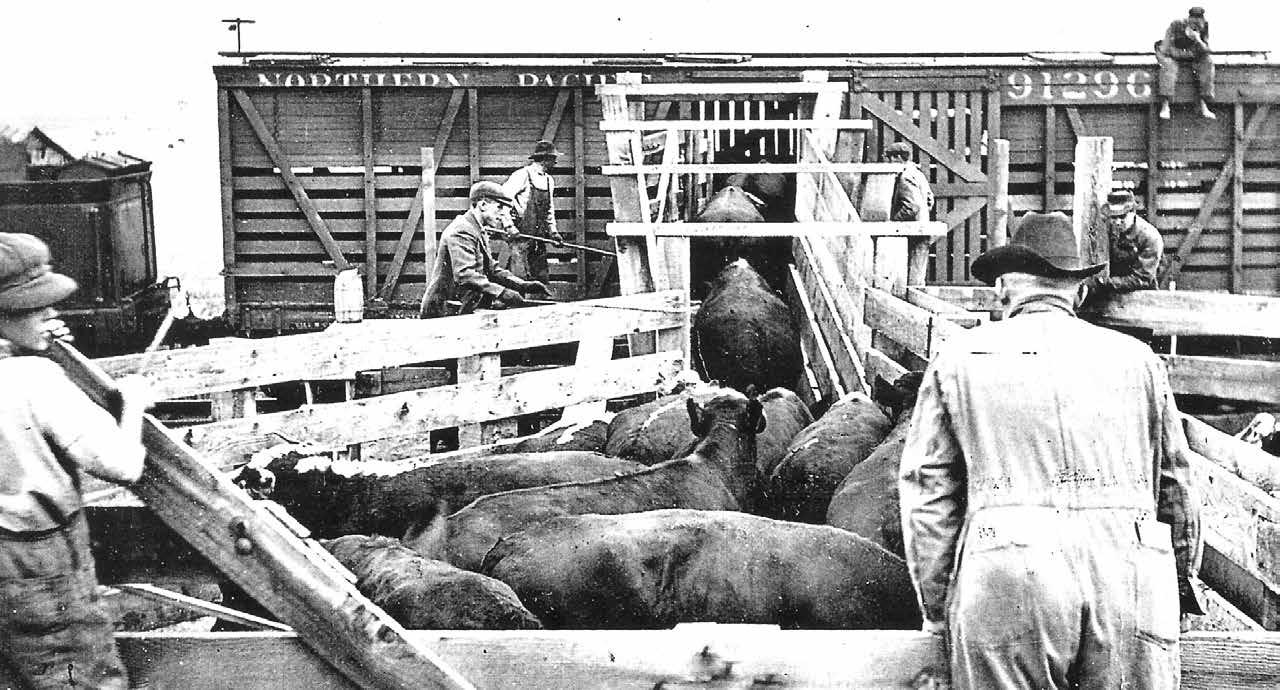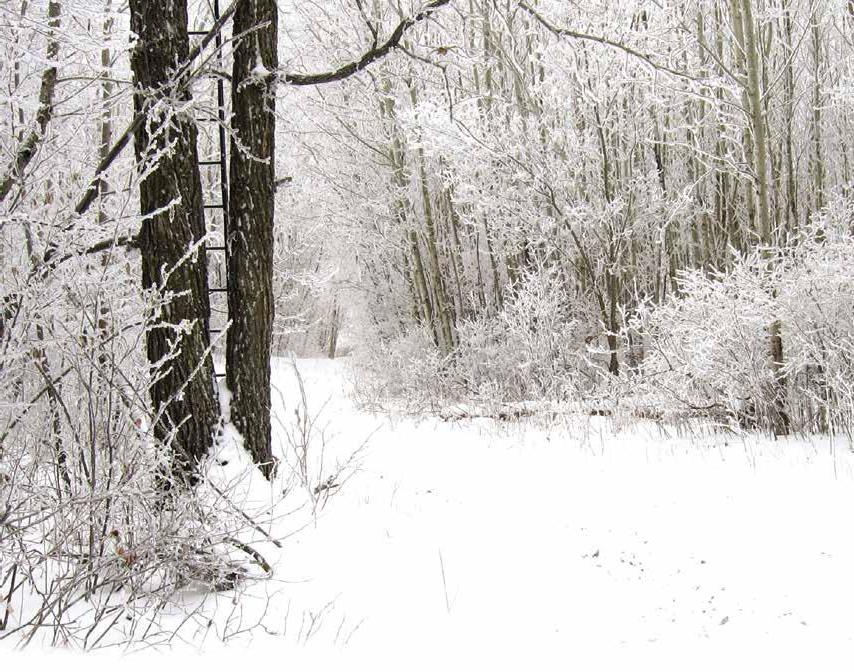
7 minute read
Fargo Brick
Evelyn grew up in this house made of yellow brick from the Fargo Brick Company, owned by her father Henry and his brother Sanford Johnson. The two brothers, both from Sweden, built homes close to each other and ran the brickyard. Henry’s home (pictured) was the larger of the two, with extra room to feed and possibly house workers in the brickyard. This home no longer exists, but Sanford’s home still stands in a city-owned park, now known as the Rheault Farm, at 2902 25th Street South in Fargo. All photos courtesy of the author.
by James Magnuson
Advertisement
My mother began writing poetry during the Depression, on a wheat farm outside Fargo, North Dakota. When she was seventeen, she sent a number of pieces to an anthology for consideration. The editor wrote her back, accepting three of them, but when he discovered how young she was, the deal was off. He promised her a copy of the anthology as a consolation prize.
She never submitted anything to anyone again. As a child, I was dimly aware that she wrote, and she may have shown me a half-dozen poems over the years. But two days after her death, at the age of eighty-three, when several of her grandchildren were searching for photographs to put up at the funeral home, the house sprouted poetry—more than a hundred poems, tucked away in drawers, in linen closets, hidden behind cereal boxes in the cupboard. Some were scribbled on the back of church programs and shopping lists, on Motel 6 stationery.
Her granddaughter Anne typed the poems, bound them, and distributed copies to the family. My father, who died within six months, asked me to do something with my mother’s writing, but what that might be, I didn’t know. I was deeply moved by the poems, but I was her son. How could I judge their literary worth? They were a long way from doggerel, but they weren’t Wallace Stevens, either, and I wasn’t about to send them off to The Paris Review.
Five years passed. Then this spring August Kleinzahler and his wife, Sarah Kobrinsky, came to dinner. August was our visiting poet at the Michener Center for the semester and Sarah is a fine poet and writer as well, no surprise. The surprise was that she’d grown up in Fargo. We started trading stories and before the evening was over, I pulled out the Kinko’s-bound sheaf of my mother’s writing.

Evelyn (on the right) with her friend Esther Lee in the 1930s. According to Evelyn’s daughter, Mary Magnuson Loew, the two girls wrote letters to each other in the form of poetry, and Esther compiled the first book of Evelyn’s poetry and gave it to her as a gift. Mary added, “Mom had mentioned dressing up just for fun [in this photo], celebrating the end of winter and an early spring. Serendipity . . . Mom’s ability to find delightful moments.”
She called me several days later. Delighted by the poems, she was filled with questions and ended up writing an article for The High Plains Reader, Fargo’s alternative newspaper. In her digging into all this, Sarah made a number of discoveries, the most miraculous of which was that the farmhouse, where my mother had spent much of her childhood and where I had lived as a child, was still standing and was now a city park. I remembered it as an astonishing place, built from the yellow clay bricks of my grandfather’s brickyard, surrounded by hollyhocks, purple lilacs, and a windrow of silver Russian olive trees.
The upshot of all this was that in July, I drove to Fargo with my brother and sister and our spouses. Sarah flew up from Austin and we did a reading of my mother’s poetry in the hundred-year-old farmhouse.
I did not expect a crowd. I assumed we would be reading to ourselves and maybe a few members of Sarah’s family, but when we arrived at the farm we were greeted by two television crews, a newspaper reporter, the director of the Nordic Culture Club, even the caretaker for the Parks Department and his wife and daughter who’d meandered in for coffee.
The next day Sarah and I did an hourlong interview on the radio, followed by another reading that night on the rooftop of a downtown hotel that had been planted with prairie grasses.
It was an emotionally charged weekend. Still the big brother, I found myself shooting my sister looks, hoping she wouldn’t burst into tears, but to tell the truth, I was as much on the edge as she was. It seemed a great cosmic joke that our mother, one of the world’s most modest people, had somehow become a celebrity. It was a revelation to sit in an audience, hearing Sarah read my mother’s work, and think, “Geez, this is real poetry.”
Sarah had selected the poems, picking some that were written when my mother was young—playing and toying around with Swedish country accents, experimenting with form. These were followed by devotional pieces, letters to God, poems with a lot of snow and wind. Much of the later work was no more than fragments, dealing with the death of a daughter, other losses, religious doubt and struggle.
Listening to the poems, I found myself struck by two ideas simultaneously. The first was how powerful language is, how it can convey its force, seventy years after the fact. Words were as durable as the yellow bricks from my grandfather’s brickyard. The second thought was how easily all those poems could have vanished without having been uttered by anyone.
The drive back from Fargo was long, with miles of wheat fields, distant silos, and plenty of time to think. I couldn’t help but compare what I’d just experienced with the universe I occupy most of the year—not just the world of young writers and MFA programs, but the wider literary world as well. Perhaps a comparison like that is unfair. My mother wrote poetry as a private act. She didn’t consider it a profession or even a vocation.
All the same, when I consider how much time we “real writers” waste licking our wounds and obsessing over where we rank on some mythical literary ladder, almost any alternative can seem attractive. Envy is the great occupational hazard. I admit that I enjoy grousing as much as anyone. What crummy book just got a great review? Who got a fellowship-prize-six-figure-advance when it should have been me? We have our work judged too often. We stay too roiled up.
To be fair, writing is a seriously anxiety-provoking profession. It takes bravery or bullheadedness to commit yourself to a life of this. You can spend five years on a book and come up with nothing. Or a decade. There is more rejection than is good for anyone. The blows keep raining down.
Still, it is important to remember that most writing of value comes from some quieter place. It furnishes its own rewards, sustains us in ways we couldn’t have imagined when we started, and, in time, with a few breaks, is capable of making its own way.
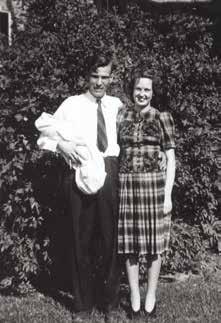
Evelyn and her husband, Roy Magnuson, with their first child, Jim, born in 1941. The couple had three more children: Mary in 1944, Joan in 1946, and Mark in 1949. The family later moved to Middleton, Wisconsin.
This article is reprinted by permission of the author from his website: http://www. jamesmagnuson.com/essay-fargo-brick.html JAMES MAGNUSON lived in Fargo in the late 1940s and early 1950s. He graduated from the University of Wisconsin, has been the Playwright in Residence at Princeton University, and has directed the James A. Michener Center for Writers (MCW) at the University of Texas at Austin since 1994. His plays have been produced at Playwrights Horizons and Lincoln Center, and he has written extensively for television. The author of ten novels, his new novel, Famous Writers I Have Known, was published by Norton last year.
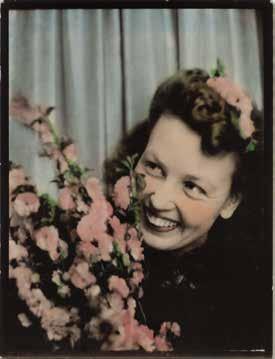
Evelyn Johnson Magnuson was born September 23, 1917, and died March 16, 2001, at the age of eighty-three.
SAMPLES OF EVELYN MAGNUSON’S POETRY
“It must have been the coffee
I couldn’t sleep a wink.
I’m sure it was the coffee.”
“Yah, dot’s vot you tink.”
-
“Of course it was the coffee.
What else?” “Now ain’t dot tuff!
Yumpin Yimminy can’t you see
That you is in luff.”
(dated 1937)
---
THE FARMER
Under his tattered hat, under his frown,
Under his shabbiness, scorned by the town,
There’s a “devil-may-care” optimist heart.
There is a poet and the earth is his art.
-
He doesn’t so often go to preaching, and such,
but he’s seen God caressing the grain
And he listens, beholding his work all undone,
to God’s chastening voice in the rain.
-
His work is with life, and watching life grow
That clamorous men may be fed.
And the grain fields in harvest, the corn bending low
Are the fulfillment that sweetens his bread.
-
They say “He hasn’t lived!” He has life in his hands:
And he knows many things no one else understands.
They may laugh at his tatters or call him a clod.
He smiles to himself and winks up to God.
(no date)
---
Then here are three short poems that she wrote when she was an old woman.
To find red sneakers where
I left them—
And a jar of instant coffee on the shelf
Just to breathe fresh air again
and be myself
---
Dear Lord—keep kneading me in the right direction
keenly in my mouth
kind things to say
make me aware
of others’ needs
—help me to be
kind—what else is there
---
The last of the three poems was written just days before she died.
Close the door gently
as you go
Leave only love behind




